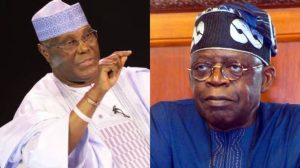
The 2023 presidential candidate of the Peoples Democratic Party (PDP), Atiku Abubakar has advanced reasons the Supreme Court should accept his fresh evidence against President Bola Tinubu.
According to Atiku, the apex court should not turn down his opportunity to present fresh evidence from the Chicago State University (CSU) regarding the petition against Tinubu because it will prove his claim that the All Progressives Congress (APC) candidate was ineligible to contest the 2023 presidential election.
The PDP candidate made the submission in a reply on the point of law he filed to counter objections that President Tinubu, the Independent National Electoral Commission (INEC), and the APC raised to query the admissibility of documents that were released to him by the Chicago State University in the United States of America.
He added that apart from proving that Tinubu was ineligible to contest the election, it would also show that the former Lagos State Governor was involved in certificate forgery.
Naija News recalls Atiku obtained a 32-page document from the CSU on Tinubu’s academic records based on the order of Judge Nancy Maldonado of the District Court of Illinois, Eastern Division, Illinois, United States of America.
The US court had ordered the CSU to release the said documents to Atiku, despite Tinubu’s objection.
However, there have been arguments from some stakeholders in the suit including President Tinubu, INEC and the APC that the Supreme Court can’t accept fresh evidence at this stage of the case.
But Atiku, through his team of lawyers led by Chris Uche (SAN), argued that contrary to the position of the respondents, no such limitation exists.
“There is no such constitutional limit of 180 days on the lower court to hear and determine a presidential election petition, such that can rob this Honourable Court to exercise its power in any manner whatsoever.
“The parties are agreed that the Constitution is the fons et origo and the grundnorm, and supersedes any other legislation,” he argued.
Besides, Atiku maintained that while tribunals were established to deal with election matters from Houses of Assembly, National Assembly and governorship elections, the Constitution gave the jurisdiction to entertain disputes from presidential elections only to the Court of Appeal.
“Thereafter, the Constitution was intentional and deliberate in setting the 180 days limit only for Election Tribunals, and not for the Court of Appeal. On the other hand, when it came to appeals, the Constitution clearly and expressly extended same to the Court of Appeal.
“The Constitution clearly excluded Court of Appeal in the preceding subsection,” he submitted.
Atiku further argued that based on Section 285 of the 1999 Constitution, as amended, the Presidential Election Petition Court, PEPC, that heard and dismissed his petition, was not an election tribunal.
He contended that the framers of the Constitution limited the application of the 180 days specifically to election tribunals by virtue of section 285(6), excluding the Court of Appeal.
“On the other hand, when it came to the next subsection, namely Section 285(7), they intentionally included and mentioned Court of Appeal.
“The trite maxim, My Lords, is “expressio unius est exclusio alterius”, meaning that the express mention of one thing in a statutory provision automatically excludes any other which otherwise would have been included by implication.
“Furthermore, when granting jurisdiction to the Court of Appeal to entertain presidential election petitions, the Constitution did not pretend that it was conferring the jurisdiction on a “tribunal”; it clearly gave the jurisdiction to the Court of Appeal. Thus, section 239(1) of the Constitution specifically provides thus:-
“Subject to the provisions of this Constitution, the Court of Appeal shall, to the exclusion of any other court of law in Nigeria, have original jurisdiction to hear and determine any question as to whether – (a) any person has been validity elected to the office of President or Vice President under this Constitution.”
Uche also noted that when conferring on the Supreme Court the jurisdiction to entertain appeals arising from decisions in presidential election petitions, the Constitution limited itself to “Court of Appeal” and made no mention of ‘tribunal’.
He cited Section 233 subsections (1) and (2)(e)(i) of the Constitution which provides that: “The Supreme Court shall have jurisdiction, to the exclusion of any other court of law in Nigeria, to hear and determine appeals from the Court of Appeal.
“An appeal shall lie from decisions of the Court of Appeal to the Supreme Court as of right in the following cases – (e) decisions on any question – (i) whether any person has been validly elected to the office of President or Vice President under this Constitution”.
He added that it was based on the above facts that the Presidential Election Petition Court itself administratively refused to be referred to as the “Presidential Election Petition Tribunal”, but the “Presidential Election Petition Court”.
“The case is not whether 2nd Respondent attended Chicago State University, but whether he presented a forged certificate to the INEC.
“That at the trial, a National Youth Service Corps, NYSC, certificate with serial number 173807 presented by the 2nd Respondent to the 1st Respondent was equally tendered by the Appellants/Applicants at the trial as “EXHIBIT PBD 1A” with the name Tinubu Bola Adekunle, which is annexed herewith as EXHIBIT-J,” Atiku added.
Naija News reports the Supreme Court has fixed Monday, 23rd October to hear the petition by Atiku against Tinubu.
The post Why Supreme Court Must Accept My Fresh Evidence Against Tinubu – Atiku appeared first on Naija News.


